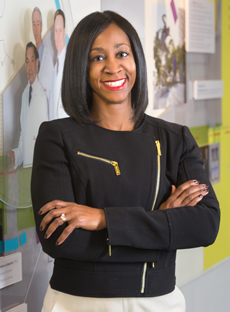
Monique Hunt McWilliams
Chief Diversity Officer, Eli Lilly and Company
MY GREATEST STRENGTH
My greatest strength is that I am a natural collaborator. I believe in working with people across visible and invisible boundaries. It helps me understand different points of view and think more critically about whether my perspective is correct, how I might need to challenge my thinking, not being so quick to reach a conclusion, and how might I need to make adjustments. Collaboration also helps me forge relationships and connections with others. My natural default is that two minds are better than one, because the thinking, brainstorming, and solutions produced by a group are potentially better than mine alone might be.
This benefits Lilly because it’s impossible to achieve a truly inclusive workplace culture that values and embraces all elements of difference, and where everybody feels comfortable contributing at his or her highest level, unless you have more than just one person working on it. In my role as chief diversity officer, I am always talking and working with people. I share ideas and I listen to ideas that others share with me. I do this is to spark interest and creativity in others, as well as to learn how we can work together to make Lilly an even better place and benefit those we serve.
LEADING BY EXAMPLE
I try to lead by example and to be as transparent as I can about why a decision is what it is, why I do the things I do, and how my decisions and actions play into what I think about the future. I talk to my team in the Global Diversity and Inclusion Office about what is happening now and acknowledge the great things that were done before I came. I also talk to them about my vision for the future and what I perceive will happen three to five years from now. I let them know that I want to position all of us for success, even if it will look different than before.
OUR GREATEST ISSUE
One of the greatest issues facing the African American community today is that we need to understand our greatness and potential. It’s easy to forget our history and the challenges those before us faced. We have to constantly reflect on that. We now have generations of young people who’ve not experienced those tough times, so it’s hard for them to understand that even when you’re in the middle of something challenging, you don’t give up. Young people have to understand that there is a whole history of people—our ancestors—who worked through something even more difficult. Our ancestors didn’t stop. And we can’t stop now.
I think this awareness is relevant in thinking about education today. I attended public school in Indianapolis and the small percentage of African Americans who are graduating from high school today is disappointing. I wish young people understood that in order to compete on a global level and have a good quality of life, the single most important thing they can do is their best in school. The choices they make now regarding education will either limit or enhance their opportunities in the future.
MY MOST IMPORTANT LESSON
The most important lesson I have learned is that I can take any role and make it my own. I know there is a job description on file, and that someone else might have been successful in the role before me, I’m not intimidated. When I take on a new role, because of the unique person I am and because of the characteristics and strengths that I bring, I make it my own. I am going to do that job differently based on what I perceive to be important and relevant, and what elements of the job play to my strengths. When I keep that in mind, I eliminate some of the intimidation that can come from taking over a job from someone else. I remind myself that there’s some greatness in me, too. Sometimes I haven’t even seen it yet, but that’s okay, because I know the greatness is there and that I’m going to strive to find it—and use it to meet every challenge.
WORDS OF ADVICE
My advice is to feel confident. While as a new hire you may not know how to do your job right away, you still can have value. You have good instincts, which have brought you this far and helped you achieve a measure of success. So, whether you’re just beginning your career or you’re an experienced professional, don’t forget to pay attention to your inner voice. It can help you decide which direction your career should take.
I also think it’s important for someone just beginning a career to identify a mentor. You don’t have to wait for someone to assign a mentor to you. Identify someone you have something in common with or connect with someone whose work or accomplishments you respect. A mentor doesn’t have to look like you. You just need to find someone who can advocate on your behalf.






